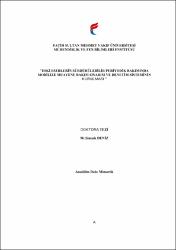Eski eserlerin sürdürülebilir periyodik bakımında mobilize muayene ve bakım-onarım ve denetim sisteminin kurulması
Citation
DENİZ, M. Şimşek, Eski eserlerin sürdürülebilir periyodik bakımında mobilize muayene ve bakım-onarım ve denetim sisteminin kurulması, Fatih Sultan Mehmet Vakıf Üniversitesi Mühendislik ve Fen Bilimleri Enstitüsü Mimarlık Anabilim Dalı, Yayımlanmamış Doktora Tezi, 2017Abstract
Eski Eserlerin Sürdürülebilir Periyodik Bakımında Mobilize Muayene, , Bakım –
Onarım ve Denetim Sisteminin Kurulması' tezinin ilk kısmında Türkiye'deki mevcut
koruma mevzuatı, kurumlar ve mali olanaklar ele alınmış ve uluslararası koruma
İlkeleri açısından Türkiye'deki koruma sistemi sorgulanmıştır.
Önerilecek koruma modeline ışık tutması düşüncesiyle Dünyanın farklı
bölgelerindeki eski eser koruma mevzuatları ve uygulamaları, farklı kıtalardaki ülke
örneklemeleriyle ortaya konmaya çalışılmıştır. Aktif, hareketli koruma modelinin
kurulması gerektiği fikrine destek olarak İstanbul Üst Bölge örneğinde 2003-2017
yılları arasında yapılan restorasyonlar ve onarımların sayısal değerleri tespit edilmiş,
İstanbul'daki toplam eski eser sayısı ile yüzdelik olarak mukayese edilmiştir.
İstanbul Tarihi Yarımada örneğindeki uygulamalar pilot bölge olarak seçilmiş olup,
türbe, tekke ve çeşmelerden oluşan anıt eserler ve Zeyrek'teki sivil mimari örnekleri
incelenmiştir. Söz konusu tarihi eserlerde öncelikle 2009 yılında yapılan onarımlar ve
müdahaleler ifade edilmiş, 2015 ve 2016 yılında çekilen fotoğraflar ve tespitlerle geçen
süredeki tahribat ve deformasyonlar belgelenmiştir.
Taşınmaz kültür varlıklarının farklı bir sistemle korunması gerektiğine dair somut
örnekler ve problemler ortaya konduktan sonra aktif/mobilize koruma modeli
önerisinin çalışma alanları ve etapları tanımlamış, merkezdeki lojistik destek birimleri
ayrıntılı bir şekilde ifade edilmiştir. Önerilen hareketli sistemin personel ve ekipman
açısından oluşumu şemalarla ifade edilmiştir. Eski eserlerde önerilen yeni koruma
modelinin müdahale edebileceği durumlar ve bakım onarımlar ise, taş yüzeyler, ahşap
aksam, çatı örtüleri, tesisat, peyzaj ve çevre düzenlemeleri olarak sınıflandırılmış ve
ayrıntılı bir şekilde anlatılmıştır. Türkiye'de koruma konusunda mevcut sistemle
önerilen yeni modelin entegrasyonunun nasıl sağlanacağı konusunda fikirler
geliştirilmiş ve şemalarla ifade edilmiştir.
Öneriler bölümünde, yeni koruma modelinin yönetim hiyerarşisindeki yeri;
Bakanlık, Vakıflar İdaresi, yerel yönetimler ve valilikler olmak üzere ayrı ayrı
şemalarla gösterilmiştir. Yasal dayanağın oluşturulmasına yönelik olarak 5226 sayılı
Kültür ve Tabiat Varlıkları Koruma Yasasında ek madde, çalışma yönetmeliği ve
Koruma Yüksek Kurulu ilke kararı örneği önerilmiştir.
Aktif/mobilize koruma modelinin finansal boyutu kaleme alınmış ve özel bütçeli bir
idare olması öngörülmüştür. Son kısımda tüm tez çalışmasının ışığı altında genel bir
değerlendirme yapılmış ve sonuçlar ortaya konmuştur. In the first part of the thesis entitled "Establishment of Mobilization Inspection,
Maintenance and Repair System in the Sustainable Preservation of Antiquities", the
existing protection legislation, institutions and financial facilities in Turkey were
discussed and the protection system in Turkey was questioned in terms of international
protection principles.
In anticipation of shedding light on the proposed model of protection, ancient
monuments protection legislation and practices in different parts of the world have
been put forward with examples of countries in different continents. In order to
support the idea that the Active Protection model should be established, the numerical
values of the restorations in the last 10 years were determined and compared with the
total number of antiquities in Istanbul.
Applications in the Istanbul Historical Peninsula were selected as the pilot
region, monumental works composed of tombs, tekkes and fountains and examples of
civil architecture in Zeyrek were examined. In the mentioned historical works,
primarily the repairs and interventions made in 2009 were expressed, and the
photographs and fixtures taken in 2015 and 2016, documented the damage and
deformation in the past.
After the concrete examples and problems that the immovable cultural assets should
be protected by a different system, the working areas and stages of the proposal of the
Active / Movable protection model are defined and the logistical support units in the
center are expressed in detail. The formation of the proposed mobile system in terms
of personnel and equipment has been expressed in schematics.
Conditions and maintenance repairs that can be interfered by the new protection
model proposed in the ancient monuments are classified and detailed in stone surfaces,
wooden parts, roof covers, installation, landscaping and environmental regulations.
Ideas on how to integrate the proposed new model with the current system of
protection in Turkey have been developed and expressed in schematics.
In the Recommendations section, the location of the new protection model in the
management hierarchy has been shown in separate schedules, including the Ministry,
the Administration of Foundations and the local governments. For the purpose of
establishing a legal basis, additional article, working regulation and the Supreme
Council for Protection of the Presence of the Cultural and Natural Heritage Protection
Law 5226 are proposed. In addition, the financial dimension of the protection model
has been superseded and specially budgeted. In the conclusion part, a general
evaluation was made under the light of the whole thesis study.



















